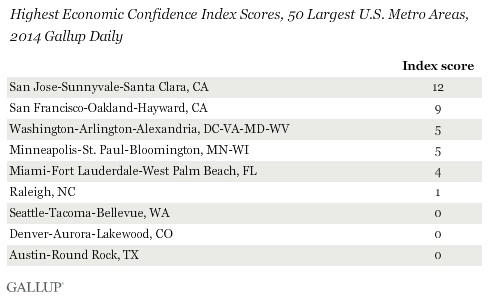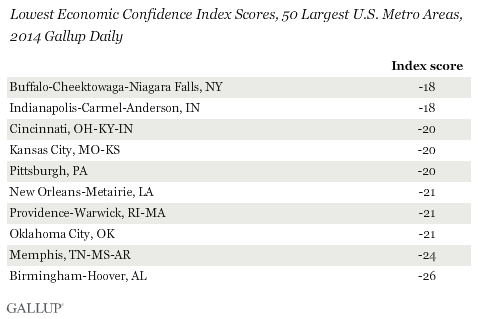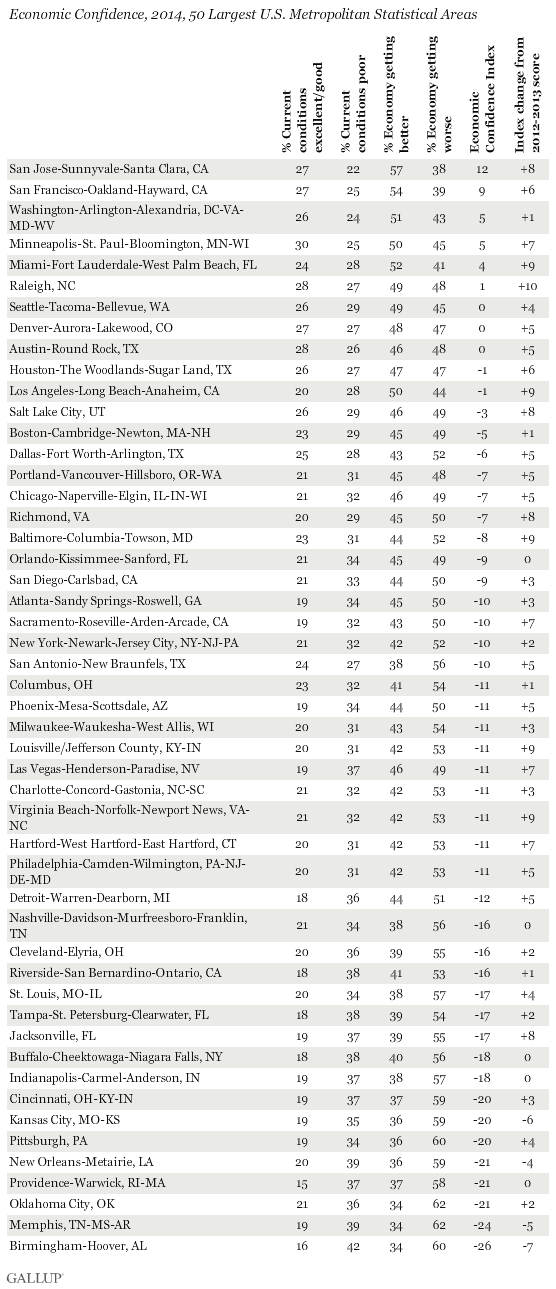WASHINGTON, D.C. -- The San Jose-Sunnyvale-Santa Clara and the San Francisco-Oakland-Hayward metropolitan areas in California posted some of the highest scores on Gallup's Economic Confidence Index in 2014. San Jose-Sunnyvale-Santa Clara boasted an Economic Confidence Index score of +12, while San Francisco and its surrounding area registered a +9. Both scores are increases from 2012-2013, and the two areas now notably surpass the index score in the Washington, D.C., metro area (+5).

Additionally, Minneapolis and its surrounding areas, Miami-Fort Lauderdale-West Palm Beach and Raleigh, North Carolina, had positive index scores in 2014. Several of the best performing cities, in terms of economic confidence, are known for their booming technology or research-related sectors including the famous Silicon Valley, which plays a heavy role in the economies of San Francisco and San Jose and Raleigh's Research Triangle Park.
These results are based on Gallup Daily tracking conducted throughout 2014 in the 50 most populous U.S. metropolitan statistical areas (MSAs). Gallup assigns respondents to metro areas using the definitions for MSAs developed by the federal Office of Management and Budget. Each MSA sample is weighted to ensure it is representative of the population of that metro area. Sample sizes range from a low of 658 for Memphis, Tennessee, to a high of 8,991 for the New York City metro area.
Gallup's Economic Confidence Index is a composite of Americans' ratings of current U.S. economic conditions and their perceptions of the national economy's direction. The index has a theoretical maximum of +100 (if all respondents rate the economy as "excellent" or "good" and say it is "getting better"), and a theoretical minimum of -100 (if all rate the economy as "poor" and say it is "getting worse").
Overall, the average Economic Confidence Index score for the top 50 MSAs was -10, compared with -15 for the entire U.S. Although the index is a measure of how Americans see the national economy faring, the different scores from city to city suggest that many Americans judge the state of the country's economy by how well their local economy is performing.
Raleigh saw the largest improvement in its index score from 2012-2013, improving 10 points from -9 to +1 in 2014. In 2012-2013, only three metro areas rated the national economy well enough to have a positive Economic Confidence Index score compared with six in 2014, as well as another three metropolitan areas that recorded a score of zero.
The areas with the lowest index scores among the top 50 MSAs are Memphis, at -24, and Birmingham-Hoover, Alabama, at -26. These scores are well below the average index score for the top 50 MSAs, and also trail the national score by a wide margin.

Birmingham also saw the biggest drop in confidence in 2014 relative to its 2012-2013 standing, with its index score falling by seven points.
Implications
In tandem with an improving national economy, the country's largest metropolitan areas are showing signs of strengthening economic confidence. As was seen in Gallup's Job Creation Index, many of the leading cities with the highest index scores have a strong presence in tech or STEM-related fields, an economic specialty that continues to see rapid growth.

The data in this article are available in Gallup Analytics.
Survey Methods
Results for this Gallup poll are based on telephone interviews conducted in 2014, on the Gallup U.S. Daily survey, with a random sample of 163,537 adults, aged 18 and older, living in all 50 U.S. states and the District of Columbia. For results based on the total sample of national adults, the margin of sampling error is ±1 percentage point at the 95% confidence level.
For results based on MSA-level data, the margin of sampling error is no more than ±5 percentage points at the 95% confidence level, and is ±4 percentage points or lower for most MSAs. Respondents are assigned to metro area using OMB definitions of metropolitan statistical areas.
All reported margins of sampling error include computed design effects for weighting.

